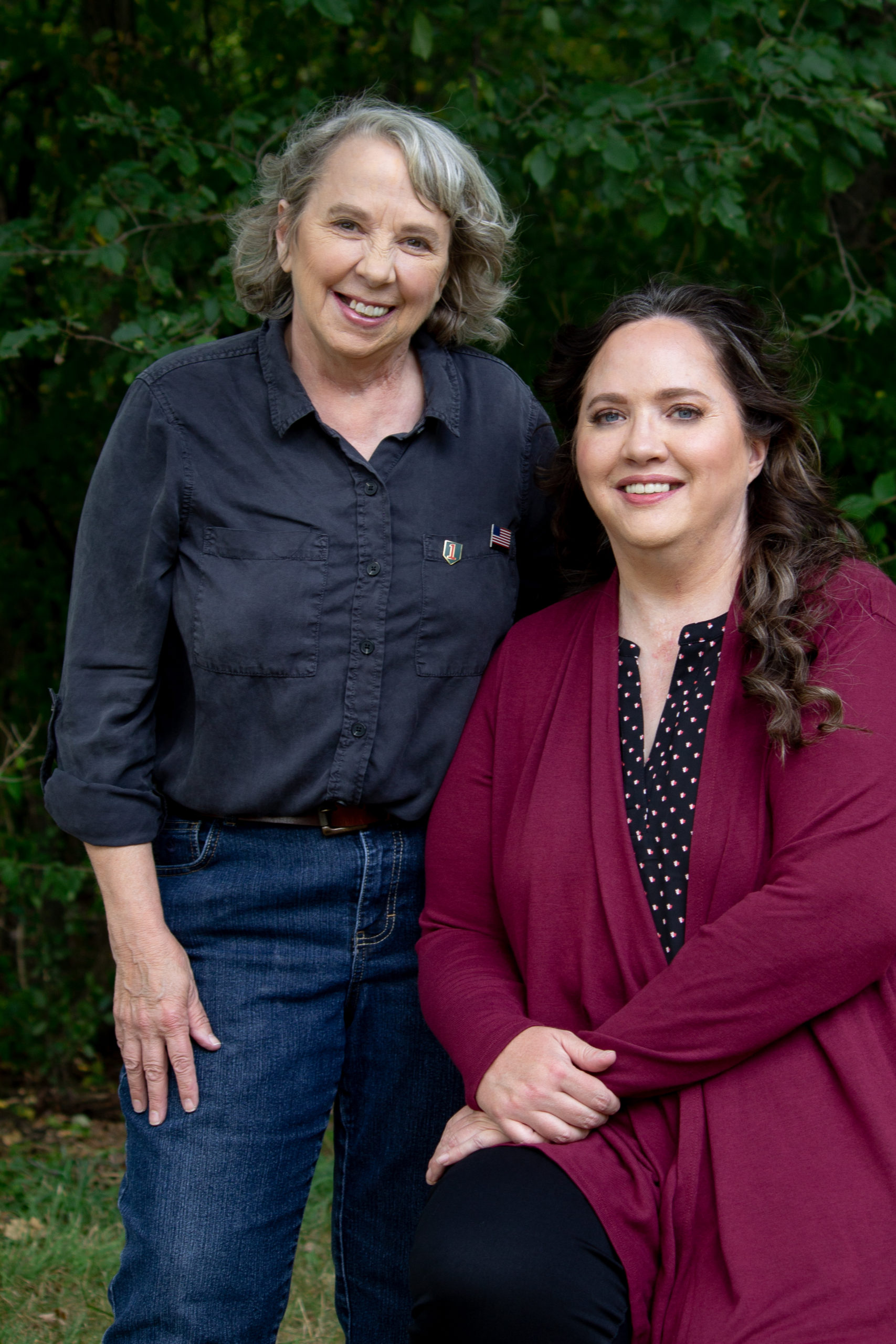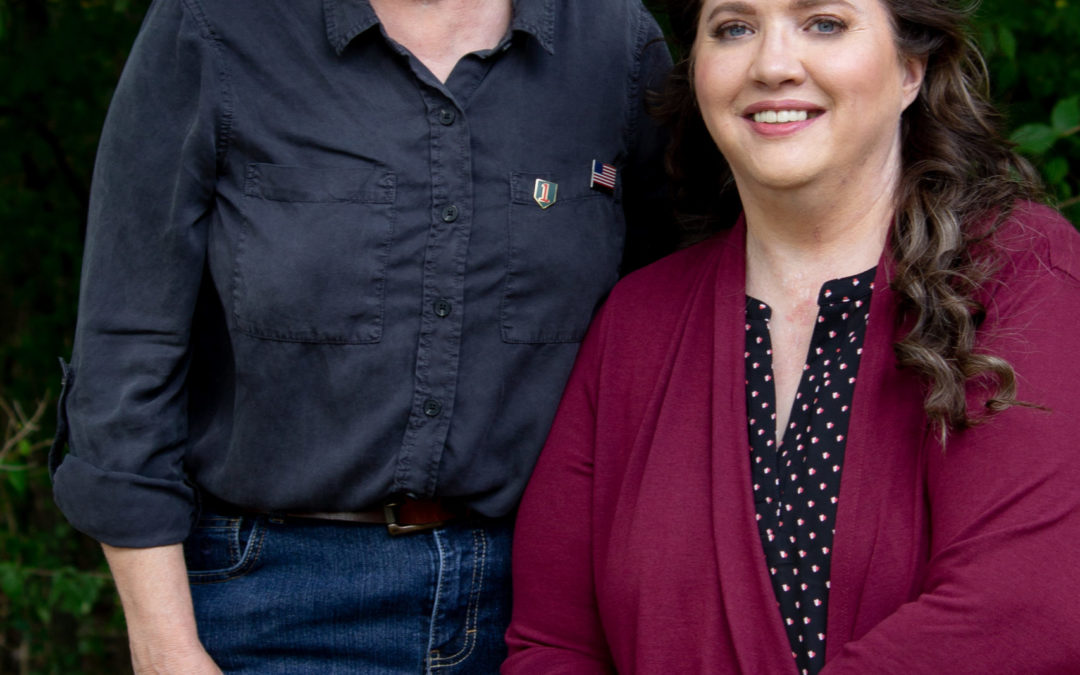
Lita Tomas:
An army tank mechanic turned global logistics manager, Major Lita Tomas in fact enlisted as an E1 with the U.S. Army in 1977, the first year women were integrated into regular units. With a master’s degree in recreational therapy, five years in the air force, and a lifetime of fighting injustice taking on everyone from the Catholic church to Congress, she’s who you want on your team. When not feeding her youngest daughter’s chickens or cheering on her three grandchildren, you can find her working on her informational and patient advocacy podcast: PodcastDX! Lita lives in Downers Grove, Illinois, with young-onset Alzheimer’s disease, two dogs, and her remaining undonated kidney.
Jean Marie McNamara:
Like her mother, with a passion to help others Jean Marie McNamara began as an E1 in the U.S. Army where she worked as a medic, as a Nuclear, Biological, Chemical, and Radiological officer, and as Deputy Director of her local Emergency Services & Disaster Agency. After an injury, Jean retired as a First Lieutenant and explored the challenges of recovery and endurance, working to claim new pathways of service and meaning. As a co-host for the award-winning PodcastDX, she loves researching diagnoses to feature. Her wry sense of humor has been bolstered by bureaucracy, and her head and spine by nuts, bolts, and two metal bars.
Q: What was your process in organizing the information for writing this book?
Jean: We started this project with an outline and a list of the key points we wanted to include in the memoir. To refresh our memories, we sorted through our collection of family photos, correspondence, and official records. Once we had our thoughts on paper, our project manager and editor helped us shuffle things around to improve the book’s flow.
Lita: Master Wings Publishing even helped us re-visit Fort Jackson, South Carolina, where we attended Basic Training (1977 and 1993). That visit brought back a flood of memories! The feel of the sand underfoot, the sound of cadence in the air, and the sight of the new recruits and their drill instructors felt oh so familiar and definitely got our pens moving.
Q: What did you learn when writing this book?
Lita: Throughout the writing process, I learned that reliving painful memories to flesh out my experiences for the reader initially created an overwhelming sense of sadness, depression, and anxiety. I felt mired down by my feelings and emotions. With the help of a counselor, my loyal posse of friends, and the support of the amazing staff at Master Wings Publishing, I now feel it was a cathartic process.
Q: What surprised you the most about writing a personal book such as this one?
Jean: It was surprising to realize how much has changed and has remained the same since my mother enlisted in the U.S. Armed Forces in 1977. The ban on women in combat has been lifted, natural hairstyles are again permitted, and there have been countless “firsts” for women serving in the military. For example, it wasn’t until 2008 that General Ann Elizabeth Dunwoody became the first female four-star general in the U.S. Army; only one other woman has received this honor since.
When I first began receiving care at my local VA hospital, they used to call for “Mr. McNamara,” now they are far more likely to call for “Ms. McNamara.” Then are some things that have yet to change. My mother and I were recently staying at a Navy Lodge. The clerk, a woman, asked for our husbands’ rank for the reservations. It was just the two of us checking in.
Q: You have both been through some trying times, to say the least. If there is any advice you’d like to give to young women entering the military, what would it be?
Lita: Keep track of your paperwork! You will hear this advice repeatedly, and for a good reason. It behooves you took to keep a copy of your documentation. When it comes time for promotion, retirement, or the like, you want to be prepared.
Jean: According to the Department of Defense’s quarterly report, the number of deaths by suicide in the armed forces has been increasing each year. Until stress management, relaxation techniques, and anger management are incorporated into everyday military training, working on these elements of mental health will make you a stronger soldier. If you are in a leadership role, please keep in mind that mental health and physical health can go hand in hand.
Also, sexual harassment, physical abuse, emotional abuse, discrimination, and racism have no place in the U.S. Armed Forces, period. During Basic Training, your drill instructors need to see how you respond to mental and physical stress. They need to know how you might react in a combat situation. We’re all likely to work on our physical fitness on our own and in school. But, mental health fitness techniques aren’t taught in most primary schools, though I think they should be taught right along with mathematics and history. I suggest preparing for your enlistment by improving your physical and mental health.
Q: What was/were your favorite part(s) of being in the military?
Lita: The camaraderie one feels with one’s troops is one of my favorite military service components. I still correspond with my company staff from 1995.
Q: Jean: If you hadn’t followed in your Mom and other family members’ footsteps, what career path do you think you would have ended up taking?
Jean: Although I did enlist in the U.S. Army, as my mother had done before me, we chose very different career fields. There are a plethora of career options available for those serving in the U.S. Armed Forces. There are job opportunities for nearly anything from accountants, astronauts, and allergists to veterinarians, transportation specialists, and wheeled vehicle mechanics. Many military occupations require no prior work experience or training. I knew that I wanted to help others from a very young age. Since that was my goal, I enlisted as a combat medic. I think had I not enlisted, I would have pursued a similar field of service.
Q: I know you have a weekly podcast. Could you tell us a little bit about it and how our readers can find it?
Lita: PodcastDX is a weekly interview-based podcast. We talk with patients and health care providers about their real-life experiences. When you’re faced with a new diagnosis, it can be life-changing. Our guests have given our listeners amazing advice, tips, and lists of resources for information and support.
Jean: We’ve had the opportunity to speak with patients, patient advocates, accessible fashion designers, writers, veterans, physicians, nurses, parents, and caregivers, from all over the world. They all want to help others and raise awareness. You can find episodes of PodcastDX anywhere you listen to podcasts. Or you can find out more on our website: PodcastDX.com, on Meta (Facebook & Instagram), Twitter, TikTok, Pinterest, and YouTube.
Q: What are some of the things that you enjoy doing currently?
Lita: At the moment, my days are filled with the happy yips of a new puppy! This year I’ll be spending more time with my daughters and my grandsons as they grow to be even more thoughtful, intelligent, responsible, and community-minded adults.
Q: If there is one thing that you would like your readers to take away after reading your book, what would it be?
Jean: After reading our memoir, I hope readers will feel that they are not alone.
Q: What is your proudest accomplishment?
Lita: After 68 years of heartbreak and joy, I’m proud to say that I’m still me. Despite hardships, betrayal, and disappointment, I am still an optimist who believes in the resiliency of the human spirit! I still believe that we should “LIVE” life to its fullest, “LOVE” unconditionally, and “LAUGH” whenever possible.

